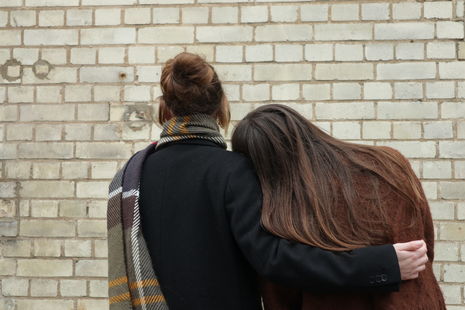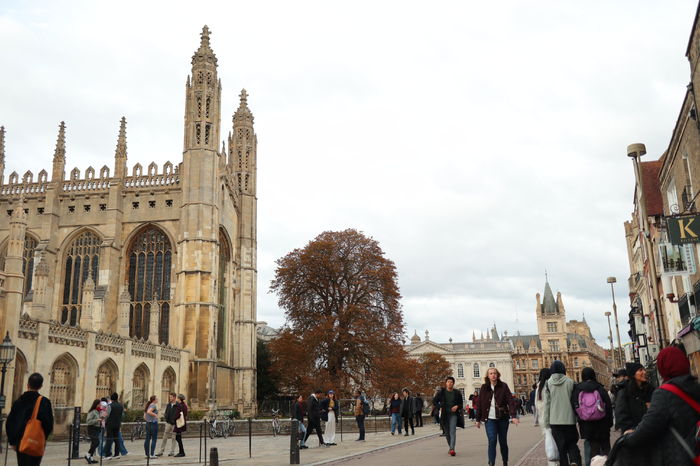Have we forgotten how to empathise?
Daisy Stewart Henderson argues that a focus on ourselves prevents us from giving each other the benefit of the doubt

When was the last time you gave someone the benefit of the doubt? Perhaps in posing this rather pointed rhetorical question, I have exposed my own hypocrisy. I’ve certainly spent too much of my time at Cambridge blinded by the idea that, being surrounded by people who seem to have everything going for them, giving them the benefit of the doubt when I didn’t like the way they acted would make me a gullible idiot.
It’s not just a Cambridge problem. Our generation discusses our thoughts and our lifestyles through a language of the self. We muse on self-love, self-care, self-discovery, concepts which, at risk of sounding like a self-loathing riddled contrarian, I have always found somewhat opaque. Achieving the elusive condition of self-love, for example, seems to demand a kind of epiphany, in which a great deal of thinking about yourself leads to a sort of mystic revelation.
“Ultimately, we really just don’t know what’s going on in someone else’s life”
Social media obviously contributes. What mode of relaxation is more accessible than that which fills our downtime with other people’s self-mythologies, making us equal parts resent the poster for the perfection they are projecting, and, perhaps more dangerously, believe that we really do know them? But it’s not just our phones; it’s our culture more generally. I love confessional pop songs as much as (probably more than) the next emotional young woman. But once you find yourself dethroning Taylor Swift’s The Tortured Poets Department from its year-long reign as your most-streamed album through a desperate compilation Britain’s most loved hymns and the most mindless club classics of the 2010s because you just can’t stand thinking about being personally wronged anymore, you realise that some self-evaluation is in order. Because as gratifying as it is when the media we consume is ‘relatable’, perhaps being able to relate everything to ourselves should not be the aspiration.
What we’ve lost, I think, is a desire to empathise. In fairness, in the bubble of university, and perhaps in the modern world more generally, it’s hard not to view yourself as an embattled protagonist. In traditional communities, where people knew each other for the course of their lives, it was impossible not to become invested in other people’s stories in one way or another. I certainly don’t want to romanticise this. I’m aware of the more lurid, and judgemental, aspects of locality, and would much prefer that the gossip that surrounds me is about who’s dating who, or whose doing particularly well academically, than whose getting divorced, and whose dying. But I do think there’s something to be said for watching people’s lives unfold as lives really do, with all the requisite messiness, which has been lost through the anonymity and transience of many modern lives.
“Our facades of polish are so impermeable that they utterly shroud our humanity”
Add the pressures of Cambridge, an environment where we are literally ranked against our peers once a year, and this introspection becomes not only a bit blinkered, but rather belligerent. There’s a sense that we need to promote ourselves; by having the cleverest answer in a supervision, the best LinkedIn, the most friends. And because we’re good at promoting ourselves, we shoot ourselves in the foot. Our facades of polish are so impermeable that they utterly shroud our humanity. Giving someone who is characterised as intelligent, and rich, and popular the benefit of the doubt when they act out, empathising with those who seem to be beating us at this unspoken competition, feels really quite foolish.
But the thing is, the experiences where empathy is most needed; death, heartbreak, misfortune; don’t care how privileged or successful you are. The vicious pairing of the false familiarity of social media, and a focus on ourselves, however, leads us to forget that, ultimately, we really just don’t know what’s going on in someone else’s life.
Where our fixation on the self is centred around artifice, however, there’s a naturalness to forgiveness, and giving people grace. In our shared time and place, there’s a connotation of weakness assigned to it. But I think, in actual fact, feeling better about yourself tends to come from thinking more about others. Read a newspaper article, a cheesy novel, a bad poem; it doesn’t have to be War and Peace. Watch a movie, or a history documentary, or phone your grandparents. Do anything that takes you out of the small, introspective world we all inhabit, if only for an hour. Try to empathise, rather than relate. And if foolishness is the cost of giving people the benefit of the doubt at Cambridge, behave idiotically. You may never know when it’s the most discerning thing you could have done.
 News / Colleges charge different rents for the same Castle Street accommodation2 March 2026
News / Colleges charge different rents for the same Castle Street accommodation2 March 2026 News / News in Brief: waterworks, wine woes, and workplace wins 1 March 2026
News / News in Brief: waterworks, wine woes, and workplace wins 1 March 2026 News / Climate activists protest for ‘ethical careers policy’1 March 2026
News / Climate activists protest for ‘ethical careers policy’1 March 2026 News / Angela Merkel among Cambridge honorary degree nominees27 February 2026
News / Angela Merkel among Cambridge honorary degree nominees27 February 2026 News / Private school teacher who lied about Cambridge degree barred from teaching27 February 2026
News / Private school teacher who lied about Cambridge degree barred from teaching27 February 2026









